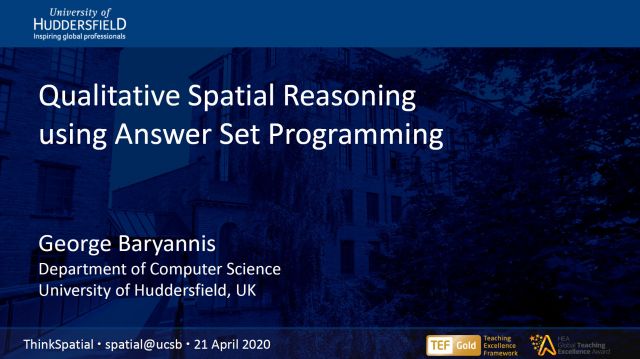ThinkSpatial: George Baryannis

Qualitative Spatial Reasoning Using Answer Set Programming
George Baryannis
Department of Computer Science
University of Huddersfield, UK
Abstract: Spatial (and temporal) information is often expressed using qualitative terms such as natural language expressions instead of coordinates; reasoning over such terms has several practical applications, such as naval traffic monitoring, warehouse process optimization, and robot manipulation. Well over 40 qualitative calculi have been proposed so far, including Allen’s interval algebra and the Region Connection Calculus. Reasoning with such calculi has been the focus of extensive research within the wider AI community, with a number of specialized reasoning tools developed. One barrier to the wide adoption of these tools is that only qualitative reasoning is supported natively when real-world problems most often require a combination of qualitative and other forms of reasoning.
I will discuss research to overcome this barrier (conducted at the University of Huddersfield, UK, and the University of Calabria, Italy), focusing on using Answer Set Programming (ASP) as a unified formalism to tackle problems that require qualitative reasoning in addition to non-qualitative reasoning. ASP is a logic-based knowledge representation and reasoning approach that includes a rich but simple modeling language and is capable of handling search problems of high complexity. Research is motivated by two case studies: reasoning about the relations among large numbers of trajectories and determining optimal coverage of telecommunication antennas.
Bio: George Baryannis is Senior Lecturer (Associate Professor) at the Department of Computer Science of the University of Huddersfield, UK. He received his Dipl.Eng. in Electronic and Computer Engineering from the Technical University of Crete, Greece, and his M.Sc. and Ph.D. in Computer Science from the University of Crete, Greece. His teaching and research interests lie within Artificial Intelligence, mainly focusing on knowledge representation and reasoning, machine learning, and interpretability, as well as applications in supply chain risk management, smart homes, and service-oriented computing.
The objective of the ThinkSpatial Forum is to exchange ideas about spatial perspectives in research and teaching, broaden communication and cooperation across disciplines among faculty and graduate students, and encourage the sharing of tools and concepts.